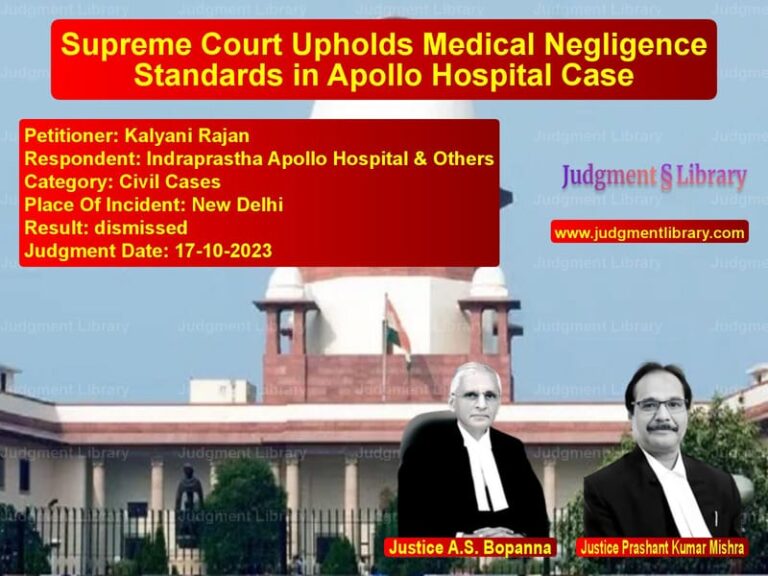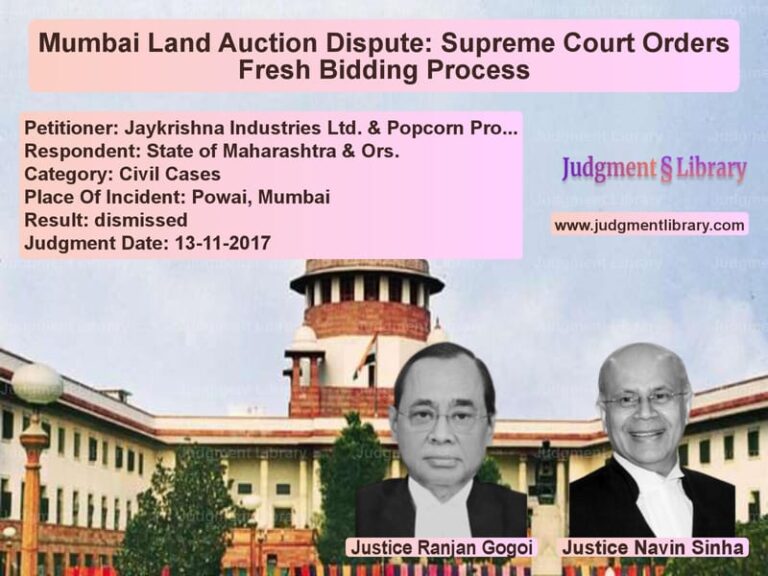Supreme Court Upholds Cadre Merger Policy in Education Department
The Supreme Court of India recently adjudicated a crucial case concerning the merger of cadres in the Education Department of Madhya Pradesh. This ruling provides a significant precedent on how policy decisions regarding government employees should be interpreted under judicial review.
Background of the Case
The case involves a dispute over the merger of the Adult Education Department into the general Education Department of Madhya Pradesh. The petitioners were originally employed under the Education Department, whereas the respondents were merged into it from the Adult Education Department.
In 1999, the state government issued an order mandating that both departments be combined, citing administrative efficiency and parity in pay scales. However, the petitioners objected, arguing that this merger negatively affected their seniority and promotional prospects.
Legal Questions Before the Court
- Was the cadre merger policy implemented arbitrarily?
- Did the merger violate the fundamental rights of the petitioners?
- Was there a legal basis for distinguishing between the two cadres?
- Could the judiciary intervene in a government policy decision?
Arguments of the Petitioners
- The merger unfairly altered their seniority rankings.
- The Adult Education cadre performed different duties and should not be equated with general education officers.
- The state government did not consult employees before issuing the merger order.
- Their promotional chances were diluted by absorbing officers from another cadre.
Arguments of the Respondents
- The state’s decision was an administrative one and was based on practical governance needs.
- Since both cadres performed similar functions, their merger was justified.
- The parity in pay scales had been achieved in 1996, and the merger was a logical extension.
- There was no fundamental right to seniority.
Supreme Court’s Observations
1. Policy Decisions Are Beyond Judicial Review
The Court reiterated that policy decisions taken by the government should not be interfered with unless they violate constitutional principles.
“It is not the function of the courts to sit in judgment over the wisdom of administrative actions unless there is patent illegality.”
2. Merger Did Not Violate Fundamental Rights
The Court rejected the argument that the merger violated the rights of the petitioners, emphasizing that employment conditions, including seniority, can be altered by policy decisions.
“The right to promotion is not a fundamental right, and changes in employment structures through policy decisions cannot be construed as violations of fundamental rights.”
3. Seniority Alone Does Not Confer Special Rights
The Court clarified that seniority is an aspect of service conditions that may be modified through rational policy decisions.
“Seniority rules may be changed through legislative or policy measures, and no vested right exists in retaining a particular rank in a merged cadre.”
4. Passage of Time Makes Reversal Difficult
Since the merger had been implemented over two decades ago, the Court found that reversing it would create administrative chaos.
“The principles of fairness and equity require that policy changes which have been implemented for long durations should not be lightly interfered with.”
Final Judgment
- The Supreme Court dismissed the appeals.
- The merger was upheld as a legitimate administrative policy decision.
- The Court ruled that the claim of dilution of promotional chances was not legally sustainable.
Key Takeaways
1. Government Employees Must Accept Policy Changes
The judgment sets a precedent that employees in government service must adapt to administrative restructuring.
2. Courts Should Not Interfere in Well-Reasoned Policy Decisions
The Court reiterated that unless a policy is unconstitutional or arbitrary, it should not be subject to judicial review.
3. Passage of Time Weakens Legal Challenges
Delays in challenging administrative decisions reduce the likelihood of a successful legal remedy.
4. Parity in Pay Justifies Cadre Mergers
Since both cadres had been granted equal pay scales prior to the merger, the Court found no basis for distinguishing them.
Conclusion
This Supreme Court ruling reinforces the principle that government policies, including cadre mergers, should not be reversed unless there is compelling evidence of unconstitutionality. It affirms that administrative changes in service structures should be accepted as part of governance.
Petitioner Name: Prafful Shukla & Others.Respondent Name: Government of Madhya Pradesh & Others.Judgment By: Justice Abhay S. Oka, Justice Rajesh Bindal.Place Of Incident: Madhya Pradesh.Judgment Date: 11-12-2023.
Don’t miss out on the full details! Download the complete judgment in PDF format below and gain valuable insights instantly!
Download Judgment: prafful-shukla-&-oth-vs-government-of-madhya-supreme-court-of-india-judgment-dated-11-12-2023.pdf
Directly Download Judgment: Directly download this Judgment
See all petitions in Employment Disputes
See all petitions in Transfers Cases
See all petitions in Promotion Cases
See all petitions in Judgment by Abhay S. Oka
See all petitions in Judgment by Rajesh Bindal
See all petitions in dismissed
See all petitions in supreme court of India judgments December 2023
See all petitions in 2023 judgments
See all posts in Service Matters Category
See all allowed petitions in Service Matters Category
See all Dismissed petitions in Service Matters Category
See all partially allowed petitions in Service Matters Category







